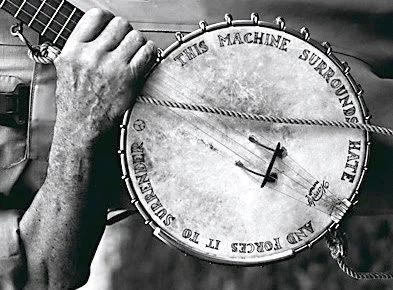Surrounding Hate and Forcing It to Surrender
Music is one of the most powerful tools we have for storytelling and connection. It moves people in a way few other things can. Anyone can join in, and nothing sticks in your head like a melody or a catchy set of lyrics. The right song can rally a crowd to joyous celebration and reduce us to tears at the same time.
In the 1940s, the iconic American musician Woody Guthrie started marking his guitars with the phrase, “This Machine Kills Fascists.” (He got the slogan from contemporary stickers that factory workers in the US were placing on the goods they manufactured to support the military during WWII.)
Guthrie’s appropriation of the phrase for a musical instrument might feel tongue-in-cheek, or a bit dramatic; it’s just a musical instrument, after all. Some might claim Guthrie was placing too much weight on something that’s nice, but ultimately not that powerful.
Nonviolence practitioners should recognize this rhetoric, and its falsehood.
Much like nonviolence, music is an underestimated practice that is actually capable of dramatic, radical, heart-moving change.
Woody Guthrie’s friend and student Pete Seeger would later adapt “This Machine Kills Fascists” into a message even more appropriate to our work at the Metta Center: his banjo proudly proclaimed, “This Machine Surrounds Hate and Forces It to Surrender.”
The tradition continues: just last year, 63-year-old classical musician John Mark Rozendaal was arrested outside Citibank headquarters in New York City while he was participating in a peaceful climate protest. Rozendaal was playing a Bach piece on his cello, which read, “This machine loves, serves, and protects life.” Although his charges were eventually dropped, Rozendaal originally faced up to 7 years in prison. Is this the powerful reaction towards a meaningless, symbolic, or empty form of protest? If music didn’t hold any serious weight as a medium for change, why go to such lengths to repress it? The powers that be recognize that music, along with other forms of storytelling, are dangerously powerful.
We have the opportunity to use this power to tell what the Metta Center calls the New Story: that we can learn how to navigate conflict in a healthy way, that the fulfillment of my needs is inseparable from the fulfillment of yours, that we are all worthy of a dignified life. For those of us organizing for peace, justice, and a better tomorrow, the question remains:
What is your instrument? What does it do?
Below, we’ve put together a short playlist of some of our top nonviolence/anti-war/political song recommendations, and invite you to make your own! If you do, let us know by sharing on your social media and tagging us @mettacenterorg.
(You can also listen by following this link.)


